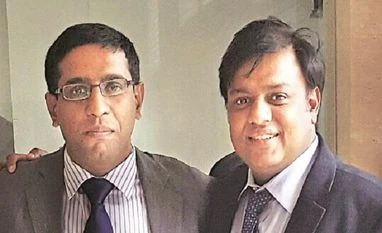Your hard-earned money will go down the drain if you are not fully aware of what you are investing in. But, with the advent of technology, change is inevitable.
“A simple, intuitive interface helps you to invest in just a few minutes. The daily report of your investments is a cool feature,” says Gaurav Agrawal, a user of the Fisdom app, a Bengaluru-based personal finance management start-up operated by Finwizard Technology.
The company recently raised Rs 250 million in Series B funding led by Quona Capital. The financing round also included investment from existing investor Saama Capital.
Incorporated in 2015, the fintech start-up was founded by Subramanya SV, former managing director at Bessemer Venture Partners in India, and Anand Dalmia, a veteran investment banker. Indian households have stayed away from financial products, particularly capital markets, for a variety of reasons, including the paradox of choice, and the lack of understanding, trust, access and time.
“Fisdom is an online wealth manager delivered via an intuitive mobile app and it solves most of the problems. The app helps people invest in the right mutual funds based on their needs. Everything from onboarding, advice, transaction, reports, withdrawal and active management is completely digital,” says Subramanya.
There are less than 10 million Indians who have invested in the capital market or in mutual funds. Among the middle class population, which is pegged at around 200-300 million, the exposure to the capital market is low.
The bulk of their savings is in the form of deposits in banks. With interest rates coming down, it is only a matter of time that money will move from bank deposits to other asset classes. The money has to find its way to the capital market, Subramanya says.
Fisdom is pitted against the traditional relationship manager model, which is grappling with falling commission rates and increasing cost of transactions, paving the way for technology-backed models. With about 50-60 million new investors expected in the capital market in the next five years, the company is betting big on its service offering.
“We are tapping this opportunity by developing an intuitive and simple solution that our customers will find good enough to use. Our key pillars are simplicity, access and trust,” Subramanya adds.
From 200,000 users now, Fisdom has set itself a target of having 1 million customers by 2020. Nearly 95 per cent of its customers access Fisdom through the mobile app, which features the products of all asset management companies.
By 2021, the Fisdom is also targeting having Rs 100 billion of assets under management on its platform. Its target customers are those in the 27-35 age bracket with incomes up to Rs 5 million per annum.
Fisdom has a commission-based model; the services are free for customers while it earns commissions from asset management companies. It hopes to break even in 2019.
The company has partnered Bank of Baroda and Lakshmi Vilas Bank to offer smart financial solutions to their customers on Fisdom.
The fintech company raised Rs 30 million from a bunch of angel investors and then Saama Capital led the first institutional round of Rs 70 million in 2016.
“In Fisdom, we are thrilled to back a team that is taking a uniquely holistic, customer-centric approach to developing savings, investments and financial management tools for emerging, underserved consumers. The solution truly democratises wealth advisory in India,” says Ganesh Rengaswamy, founding partner at Quona Capital, which manages the Accion Frontier Inclusion Fund.
Unlock 30+ premium stories daily hand-picked by our editors, across devices on browser and app.
Pick your 5 favourite companies, get a daily email with all news updates on them.
Full access to our intuitive epaper - clip, save, share articles from any device; newspaper archives from 2006.
Preferential invites to Business Standard events.
Curated newsletters on markets, personal finance, policy & politics, start-ups, technology, and more.
)